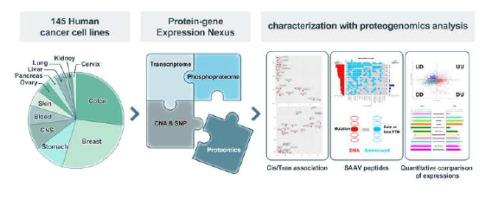Computational and Structural Biotechnology Journal ( IF 6 ) Pub Date : 2021-08-17 , DOI: 10.1016/j.csbj.2021.08.022 Daejin Hyung 1 , Min-Jeong Baek 1 , Jongkeun Lee 1 , Juyeon Cho 1 , Hyoun Sook Kim 1 , Charny Park 1 , Soo Young Cho 1, 2

|
Researchers have gained new therapeutic insights using multi-omics platform approaches to study DNA, RNA, and proteins of comprehensively characterized human cancer cell lines. To improve our understanding of the molecular features associated with oncogenic modulation in cancer, we proposed a proteogenomic database for human cancer cell lines, called Protein-gene Expression Nexus (PEN). We have expanded the characterization of cancer cell lines to include genetic, mRNA, and protein data of 145 cancer cell lines from various public studies. PEN contains proteomic and phosphoproteomic data on 4,129,728 peptides, 13,862 proteins, 7,138 phosphorylation site-associated genomic variations, 117 studies, and 12 cancer. We analyzed functional characterizations along with the integrated datasets, such as cis/trans association for copy number alteration (CNA), single amino acid variation for coding genes, post-translation modification site variation for Single Amino Acid Variation, and novel peptide expression for noncoding regions and fusion genes. PEN provides a user-friendly interface for searching, browsing, and downloading data and also supports the visualization of genome-wide association between CNA and expression, novel peptide landscape, mRNA-protein abundance, and functional annotation. Together, this dataset and PEN data portal provide a resource to accelerate cancer research using model cancer cell lines. PEN is freely accessible at http:/combio.snu.ac.kr/pen.
中文翻译:

蛋白质基因表达 Nexus:通过蛋白质基因组学分析对人类癌细胞系进行综合表征
研究人员使用多组学平台方法研究全面表征的人类癌细胞系的 DNA、RNA 和蛋白质,获得了新的治疗见解。为了提高我们对与癌症致癌调节相关的分子特征的理解,我们提出了一个人类癌细胞系的蛋白质基因组数据库,称为蛋白质基因表达关系 (PEN)。我们扩展了癌细胞系的表征,包括来自各种公共研究的 145 种癌细胞系的遗传、mRNA 和蛋白质数据。PEN 包含 4,129,728 种肽、13,862 种蛋白质、7,138 种磷酸化位点相关基因组变异、117 项研究和 12 种癌症的蛋白质组学和磷酸化蛋白质组学数据。我们分析了功能特征以及集成的数据集,例如拷贝数改变 (CNA) 的顺式/反式关联、编码基因的单氨基酸变异、单氨基酸变异的翻译后修饰位点变异以及非编码区和融合基因的新肽表达。PEN 提供了一个用于搜索、浏览和下载数据的用户友好界面,还支持 CNA 与表达、新肽景观、mRNA-蛋白质丰度和功能注释之间的全基因组关联的可视化。该数据集和 PEN 数据门户共同提供了使用模型癌细胞系加速癌症研究的资源。PEN 可在 http://combio.snu.ac.kr/pen 上免费访问。以及非编码区和融合基因的新型肽表达。PEN 提供了一个用于搜索、浏览和下载数据的用户友好界面,还支持 CNA 与表达、新肽景观、mRNA-蛋白质丰度和功能注释之间的全基因组关联的可视化。该数据集和 PEN 数据门户共同提供了使用模型癌细胞系加速癌症研究的资源。PEN 可在 http://combio.snu.ac.kr/pen 上免费访问。以及非编码区和融合基因的新型肽表达。PEN 提供了一个用于搜索、浏览和下载数据的用户友好界面,还支持 CNA 与表达、新肽景观、mRNA-蛋白质丰度和功能注释之间的全基因组关联的可视化。该数据集和 PEN 数据门户共同提供了使用模型癌细胞系加速癌症研究的资源。PEN 可在 http://combio.snu.ac.kr/pen 上免费访问。该数据集和 PEN 数据门户提供了使用模型癌细胞系加速癌症研究的资源。PEN 可在 http://combio.snu.ac.kr/pen 上免费访问。该数据集和 PEN 数据门户提供了使用模型癌细胞系加速癌症研究的资源。PEN 可在 http://combio.snu.ac.kr/pen 上免费访问。



























 京公网安备 11010802027423号
京公网安备 11010802027423号